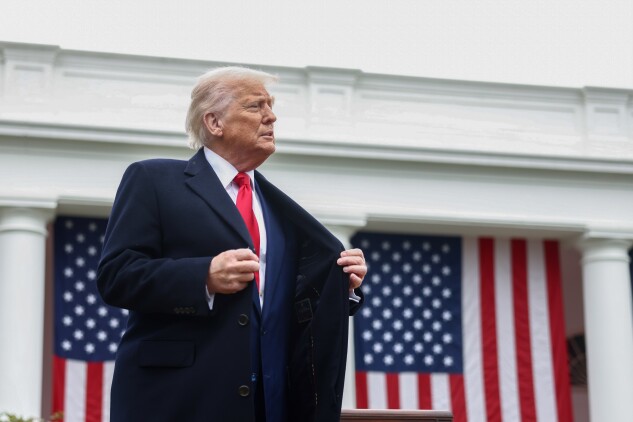Monday morning musings for workplace watchers.
Trump’s Loyalty Rewards | Labor’s Friends in the GOP
Courtney Rozen: President Donald Trump wants to tie federal employees’ pay to how well they execute his agenda, rewarding loyalty among key personnel in the government.
Senior managers will have to “clearly and demonstrably” help Trump execute his policy goals to receive high marks on their performance reviews, according to new criteria released by the administration. Managers will also be expected to reduce costs and paperwork.
That’s a significant change from previous years, when the performance review criteria didn’t even mention the word “president.”
“It’s all about trying to emphasize and reward loyalty,” said Nancy Segal, an HR consultant for federal agencies and employees.
The new standards will apply to about 9,000 senior managers. That includes members of the Senior Executive Service, career leaders that work at agencies across administrations.
Jim Green, who specializes in federal personnel law, said the requirement that executives help the president execute his agenda “doesn’t trouble me.” Senior federal managers already help execute the president’s policy priorities, he said.
“That was my job,” said Green, who spent decades in the Senior Executive Service.
But the administration’s new practice raises legal questions.
Managers ranked poorly because they didn’t adequately support the president’s agenda may accuse their employers of violating civil service laws that prohibit discrimination based on political affiliation, said Joanna Friedman, a federal sector employment lawyer at Federal Practice Group. They could file a complaint with the Merit Systems Protection Board, the panel that mediates disputes between agencies and their employees, she said.
More changes are likely afoot for these managers too.
The Office of Personnel Management, the federal government’s HR division, directed federal agencies in February to make lists of senior roles historically held by career staff and decide how many to fill with political appointees. Senior managers are “on eggshells just like anyone else, not knowing what’s going to come next and whether they’re going to be on the chopping block,” Friedman said.
Parker Purifoy: A bipartisan group of House lawmakers is moving to reverse President Trump’s order terminating collective bargaining agreements for a large swath of federal workers, a sign labor still has friends in a Republican-controlled Congress.
Reps. Jared Golden (D-Maine) and Brian Fitzpatrick (R-Pa.) introduced the Protect America’s Workforce Act , seeking to reverse Trump’s March 27 executive order which canceled union contracts at over 40 agencies, subagencies, and offices in the government.
It’s one of the first legislative steps to push back on Trump’s battle to expand his power over career federal workers. The executive order pointed to a 1978 law that empowers the president to prohibit employees whose work “directly affects national security” from organizing.
Fitzpatrick said in a joint statement with Golden that the legislation would move the administration towards a “balanced, targeted” approach to downsizing the federal workforce.
“Sweeping exclusions from collective bargaining are a blunt instrument that risk weakening the very stability and performance we aim to strengthen,” he said. “We can defend our national security without silencing those who serve it. Efficiency and fairness are not mutually exclusive — and this legislation ensures we uphold both.”
The bill was co-sponsored by six other House Republicans and 22 Democrats. A group of eight GOP lawmakers called on Trump to reconsider the executive order and said the whole-sale eradication of union contracts could “unintentionally affect government efficiency and employee morale.”
The GOP lawmakers listed on the letter are Fitzpatrick and Reps. Michael Lawler (R-N.Y.), Don Bacon (R-Neb.), Michael Turner (R-Ohio), Nick LaLota (R-N.Y.), Andrew Garbarino (R-N.Y.), Rob Bresnahan Jr. (R-Pa.), and Chris Smith (R-N.J.).
Federal sector labor unions quickly signaled support for the legislation.
“We urge both houses of Congress to immediately take up and pass this bipartisan legislation,” said Everett Kelley, president of the American Federation of Government Employees. “Now is the time for lawmakers to stand up for working-class Americans across this country and use their power to protect the dignity and rights of those who proudly serve our nation.”
The National Treasury Employees Union sued the Trump administration March 31, arguing that the president exceeded his authority and violated the law with the executive order. AFGE joined with a lawsuit of their own on April 4.
We’re punching out. Daily Labor Report subscribers please check in for updates during the week, and feel free to reach out to us.
To contact the reporters on this story:
To contact the editors responsible for this story:
Learn more about Bloomberg Law or Log In to keep reading:
See Breaking News in Context
Bloomberg Law provides trusted coverage of current events enhanced with legal analysis.
Already a subscriber?
Log in to keep reading or access research tools and resources.


